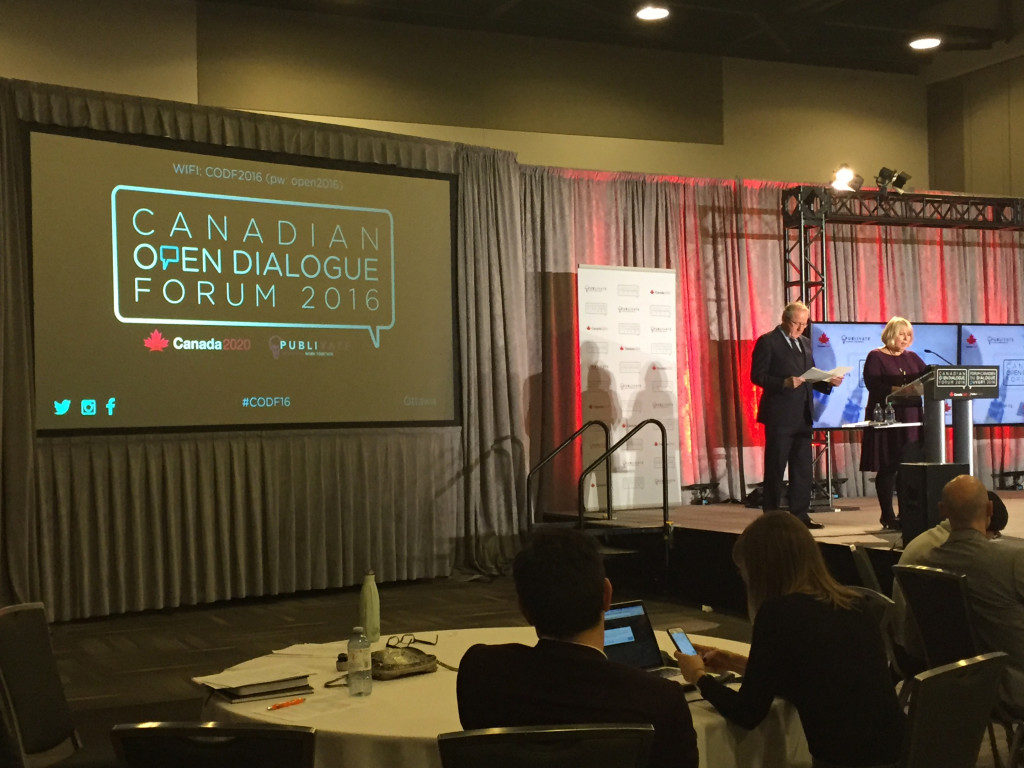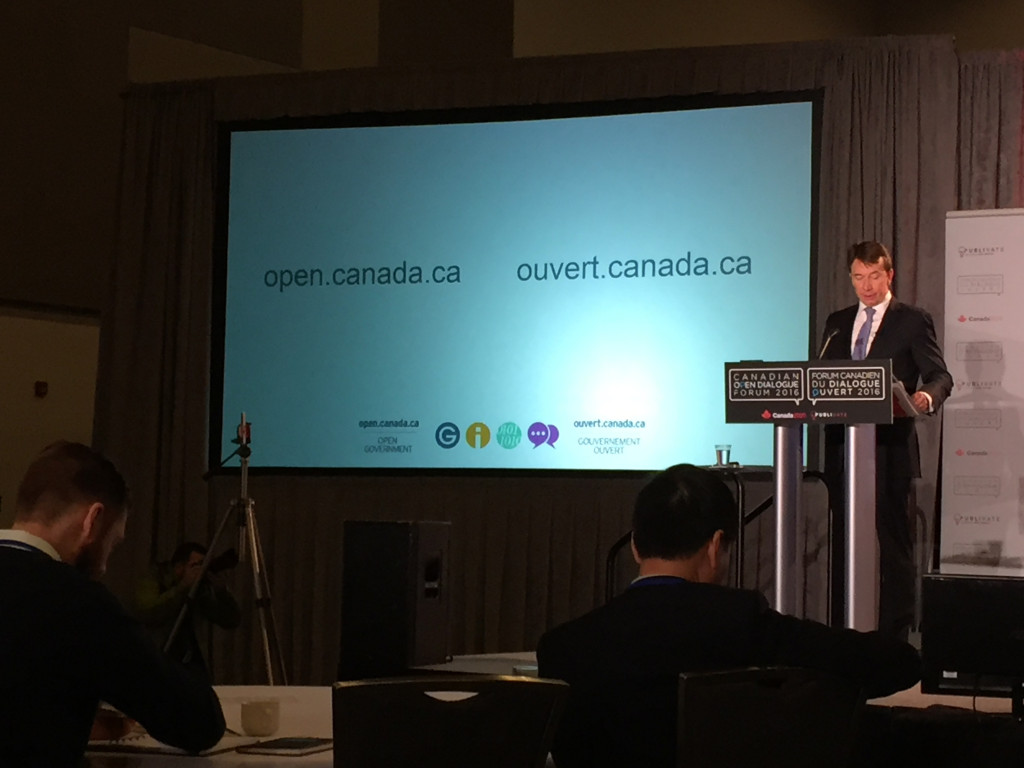
If on a future visit to the City of Lights you wind up visiting the restored “Petite Ceinture” railway in the heart of the metropolis (a project vaguely reminiscent of New York’s High Line park), you’ll have average Parisians to thank for the project. Ditto for the conveniently located public water fountains that may be installed in the years to come.
Through the city’s Budget Participatif citizens engage in a public process where they can propose and vote for €100 million in funding for projects that make their city better, and also encourage the participation of youth. In 2015, 66,867 Parisians voted in this open government exercise.
To hear the high-profile figures who spoke at this year’s Canadian Open Dialogue Forum in Ottawa, this kind of citizen-driven process is where policy-making is headed. Voices from organizations such as the OECD, Facebook, Open Text, and a handful of speakers from Europe evangelized about the benefits of not just asking people what they think of a proposal, but getting them to participate in the formulation of it in the first place, and sometimes even involving them in the delivery of solutions.
Part and parcel of this is making sure government data is made available for the public and the private sectors to use freely. Bernard Rudny and James McKinney wrote about this in a Policy Options magazine article last week.
If you had any doubt that there is some momentum behind the open government push, consider that the conference featured Ontario Premier Kathleen Wynne and federal Treasury Board President Scott Brison, and it was chaired by Ontario Deputy Premier Deb Matthews and former federal Clerk of the Privy Council Wayne Wouters.
Wynne insisted that open government is the right thing to do – it’s what the public expects. Antipoverty activist Paul Born of Tamarack recounted how a neighbourhood in Northern Ireland flourished with the power of citizen mobilization. Born recounts that a local priest told him, “We listened and we gained a corner on the obvious.”

But it’s hard not to see two major drivers of the open government movement domestically. One is economic, and the other is political.
OpenText chairman Tom Jenkins, who led a landmark federal study on research and innovation, delivered a compelling presentation on how opening up information and encouraging digitization is key to making Canada more competitive. Rodney MacDonald, a senior executive at Intuit, the firm that brings you the TurboTax software, talked about how their business was built on the fact the Canada Revenue Agency opened up its process data to the private sector. The Trudeau Liberals are also making the argument that more openness and consultation will help ease the way to major natural resource project approvals.
Meanwhile, politics can never be far behind when cabinets decide a particular project is a priority. One only has to look at the mass repudiation of the political class in countries such as Brazil, Guatemala, Spain, and even in the United States (see Donald Trump) to understand that people feel increasingly distant from decision-makers.
Prime Minister Justin Trudeau was part of that political class, yes, but he seemed to overcome that knock by making transparency, openness and engagement part of his daily mantra.
As for Wynne, not to diminish her commitment to open government, but she’s also still dealing with the aftermath of the Ontario gas plant scandal, in which potentially damaging public documents were destroyed.
Politics will ultimately (and naturally) be the biggest hurdle in the push for open government.
Interestingly, public servants who attended the forum repeatedly expressed doubts that the bureaucracy would be able to embrace the idea – the cover-your-ass culture of the public service didn’t inspire risk-taking or openness.
“How can we be innovative and open when you feel if you’re doing something innovative you’re breaking a rule?” Wouters exclaimed during one panel.
Wouters pointedly noted that nothing much will happen “without political leadership” – the room was too polite to say that 10 years of the Harper Conservatives had also inculcated a generation of public servants in the ways of secrecy. The Government of Canada’s communications policy became a joke.
There are compelling recent examples of how government institutions close their doors by default – on Friday, the CBC reported that Ottawa’s Police Services Board has been meeting secretly, even to discuss issues such as racial profiling. Correctional investigator Howard Sapers is currently studying why distraught families cannot get information about why their loved ones died in prison.

The culture problem is real, but it’s politicians and their party apparatuses that will ultimately be the speedbumps in the road to open government. Matthews pointed out that governments work in a “very toxic work environment…open information, open data, gives opposition parties ammunition to ask questions,” and she also mentioned the gotcha tendency among journalists.
The reflex to conceal becomes strong the bigger the political scandal. Parliamentary committees, which are supposed to be an important consultative tool and source of information, close in on themselves the stickier the subject. This is where increasing the powers of information commissioners and supporting quality journalism will be key.
Potentially more difficult, though, will be overcoming the impetus of electoral politics. Political marketing (see Susan Delacourt’s book Shopping for Votes for an excellent overview) favours developing policy that will appeal to the parts of the electorate that will help a party form a minimum winning coalition. Polling, focus groups and other consultative tools can help the parties devise policies and communications plans that will have strategic appeal.
At the same time, lobbyists have identified the benefit of creating “communities of interest” around particular policy issues that are important to their clients. Those communities can be leveraged for the powerful pressure they can put on decision-makers.
Those types of consultations don’t necessarily have the public interest at heart. They don’t necessarily have to include all voices.
That is why it might be easier to engage with citizens on something like laws to protect condo owners, as Ontario did, but harder to open up the floor to citizens and experts on something that was a key platform promise or that is tied up with the party’s fortunes.
In the next few years, if this open dialogue momentum holds, it will be interesting to see which areas of the policy-making process are opened up to the public. It’s impossible not to want to see the promise of more openness and transparency succeed.







